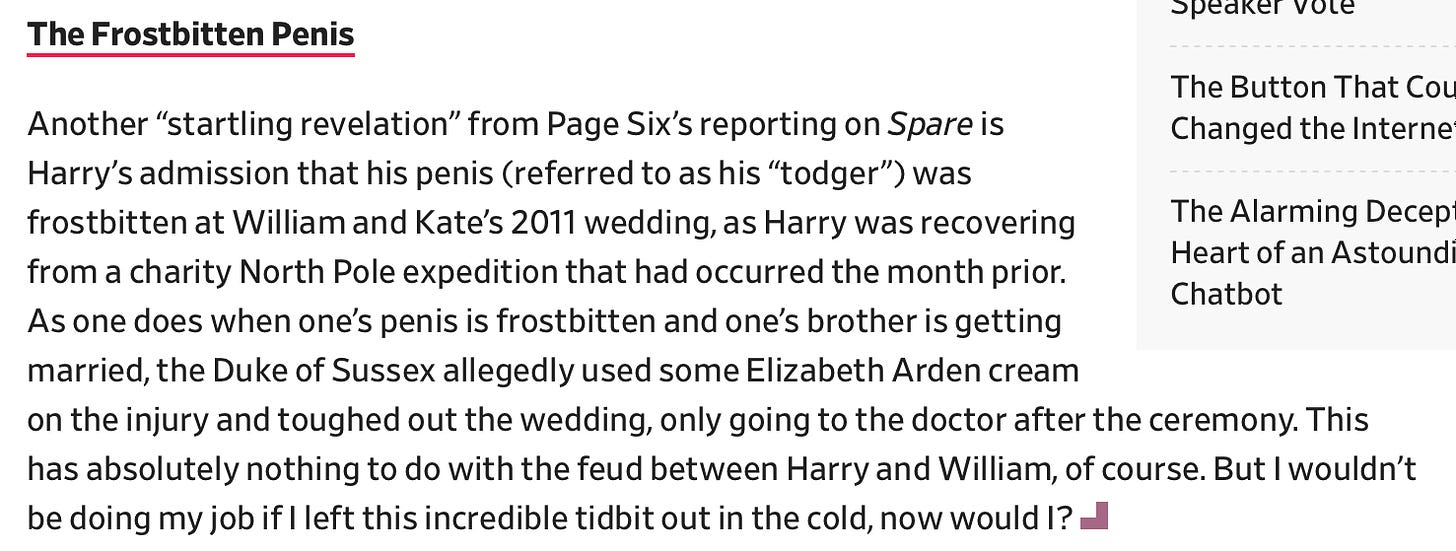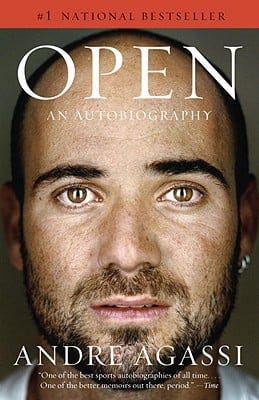It’s a drag when the book everyone is talking about is a book you have no interest in reading.
The book everyone is talking about is Spare by Prince Harry, Duke of Sussex, which has caused something of a media frenzy in the week prior to its actual official release (Tuesday, January 10).
If you watch morning television, as I do, you may have noticed that tidbits leaking out about the book’s contents are teased at the top of the show, and then shared no later than the end of the first half hour. Earlier this week, lantern-jawed Today Show correspondent Keir Simmons was shown clutching the Spanish-language edition, promising bombshells gleaned from a frantic read-through by news staffers, and I wondered how a man who has also covered terrorism and war, and appears to be a decent journalist feels about being the go-to for reporting on royal gossip, chosen perhaps because he has a British accent, and also looks like a prince out of a Hallmark movie.
Simmons had a Spanish-language edition because the book had accidentally been put on sale early in Spain1, allowing organizations to scoop the choicest tidbits in advance of release.
Slate has been doing readers the favor of cataloging the leaks, sharing such stunners as:
And:
There’s more at that link above, and if you’re anything like me when I first saw it on Twitter, you’re clicking to see what other royal tea Harry has spilled, because why not?
I clicked, even though the soap opera of royal intrigue is rather low on my list of personal interests. I wouldn’t put my intrigue at zero on a scale of one to ten, but I couldn’t go much higher than a three or four. I watched The Crown until a sense of diminishing returns kicked in mid Season 2. I also caught a few minutes of Harry and Meghan’s Netflix series as Mrs. Biblioracle played it in the background while she was doing other things. It made me feel broadly sympathetic to their claims that the British press has been unfairly targeting the Duchess and the royal family has not done enough in response.
But deep down, I must confess, I don’t really care about any of it. I didn’t get up at 6am to watch Diana wed Charles either, though I know lots of people my age who did.
However, I am interested in what this kind of book and the public’s response to it says about publishing and what and how we choose to read certain books.
As weighed against the genre of celebrity memoirs, there is a decent chance that Spare is actually a good “book,” delivering more than the sum of its juicy bits. The reason for this is because it was ghostwritten by JR Moehringer, who is not just a prize-winning journalist and acclaimed author of his own books, (including memoir The Tender Bar), but also a highly successful ghostwriter, having worked on books by Andre Agassi and Nike founder Phil Knight.
Moehringer’s Agassi book, Open is a fantastic and insightful tale of what it’s like to be raised like a hothouse flower to become a tennis champion, and the toll that kind of life takes on a person. It’s probably one of my favorite sports memoirs/biographies I’ve ever read.
It is interesting that the publisher has been so forthright about Moehringer’s participation in the project. Some of this is likely due to a recent push to give more deserved acknowledgement to the pros that do the bulk of the writing of these books, but I think it’s also aimed at readers like me who are not invested in the story of Harry and Meghan per se, but might be interested in an interesting and well-told story about Harry and Meghan, if that distinction makes sense.
The Agassi book was interesting because of the candor and insights brought out by Moehringer in his examination of Agassi’s life. It’s possible something similar was achieved with Harry, but, and perhaps this isn’t fair given that I haven’t and probably won’t read it, I have my doubts. (If anyone does read the book, and thinks I’m off base, let me know by email or in the comments.)
Part of the context of the Agassi book was the release of a story we really knew nothing about, things that had been deliberately hidden away so as not to damage Agassi’s status as a sporting icon. The book came out long after his retirement and remarriage to women’s champion Steffi Graf. The candor Agassi allowed on the page reads like a midlife reckoning by a man who has found some measure of peace, but in the telling is in search of more.
That’s a pretty compelling rationale for writing a memoir, and it shows.
Prince Harry, on the other hand, is in the midst of a PR campaign against the British Crown, and a participant in a soap opera that has been chronicled constantly since Harry was a young child, to the point that it has become a literal drama in the form of The Crown.
I’m certain there is a fascinating story to tell about Harry and the life he’s lived as the “spare to the heir,” but I’m not convinced that Harry is necessarily the best conduit for that story in terms of creating a compelling reading experience beyond the intrinsic interest of Harry telling his story.
I could be totally wrong about this, and I’m sure I’ll read at least a couple of reviews of the full book just to check my assumptions, but for now, it’s not on my personal TBR list.
Is it on yours?
Harry was reportedly paid $20 million for his memoir, with another tranche of the same amount being promised for several future books. It seems like an absurd amount, but given that there is worldwide interest in the book, when you factor in foreign rights, it may be a relatively safe bet in terms of a return on investment for the publisher.
I used to do the math on these kinds of advances and point out that these huge sums could instead by repurposed to providing 400 novelists respectable advances on their possibly mind-blowing works, but business is business, and spending $20 million for a book that’s going to get talked about in the first hour of the Today Show for a few weeks is a better investment than those 400 novels that will go mostly unreviewed and unread.
Sorry for injecting that bummer in there, but let me end on something of a bright side, namely that our culture still seems to support the existence of books as perhaps a superior mode to tell one’s story as compared to other mediums. We already have six hours of Harry and Meghan on Netflix, but the interest in Spare suggests that books still matter.
I mean, here I am talking about a book I’m not even going to read. What more proof do you need?
Links
In my Chicago Tribune column this week I tackle ChatGPT from a little different angle. Click to see how I think it relates to classic films from my youth, WarGames and The Terminator.
If your curious about what it’s like to work as a ghostwriter, Elizabeth Harris at the New York Times talks to some of the leading practitioners about their tricks of the trade. I’ve always been intrigued by the thought of ghostwriting and once even cold-solicited Colin Hay, lead singer of Men at Work, to help him write a memoir of his life as a musician, after seeing him perform. He’s a great raconteur, stuffed with wonderful stories. Much to my surprise he actually emailed me back and said he was working on something and wanted to keep working on his own. This was years ago. I hope we see it one day.
For years, someone was stealing unpublished manuscripts by authors both famous and not from agents and publishers, but not pirating them. A total mystery that has now been definitively solved.
A collective of folks has compiled a list of “31 Books We Can’t Wait to Read in 2023” for Vulture.
Barnes & Noble has apparently gotten off the mat and is showing signs of vigor. How did they do it? According to Ted Gioia, they did something super radical for a bookstore: they focused on books.
Recommendations
While I’ll be continuing to use the affiliate income to support Open Books in Chicago, I’d like to spread the wealth this year and add another book related non-profit to the stable that will receive half of the money along with my matching funds.2
Got a book charity you think is worthy of support? Email me or post it in the comments.
1. Sense and Sensibility by Jane Austen
2. A Confession of a Child of the Century by Thomas Rogers
3. The Lincoln Highway by Amore Towles
4. Some Came Running by James Jones
5. Small Things Like These by Claire Keegan
Teresa P. - Indianapolis, IN
Glad to see others hopping on the A Confession of a Child of the Century bandwagon. This makes five people who have emailed me to say they sought out and read the book after I covered it in a previous newsletter. For Teresa, I’m recommending a great Midwestern novel for someone living in the Midwest, So Long, See You Tomorrow by William Maxwell.
I hope everyone’s new year is off to a grand beginning. Next week, following the anniversary date of so many of the initial subscribers, I’ll be giving an update on subscription revenue and my hopes and dreams for enhancing the experience of reading The Biblioracle Recommends.
Be well,
John
The Biblioracle
It’s interesting that the Spanish version title, “En la Sombra” translates to “In the Shadow" which to my mind doesn’t quite capture the full meaning of “Spare” as it’s used in the untranslated version. Goes to show the challenges and inevitable compromises that accompany the work of translation.
Up to 5% of the subscription revenue for The Biblioracle Recommends, or $500, whichever is larger.








No, not going to read, or at least, no plans at present, and I DID watch 3 seasons of The Crown, and used to think myself quite the royal gossip fan, being such an anglophile, but apparently my anglophilia is moving in other directions these days. But I can relate to the feeling. I didn't read Kite Runner, DaVinci Code or Angela's Ashes (not that I'm comparing these books to Spare or to each other on their literary merits, just widespread popularity) until LONG after the fuss died down. Just saying. Also, is anyone talking about how "spare" may have a slang meaning of "crazy"? PS Just finished Small Things Like These by Claire Keegan. LOVED. Thank you, because without your column/blog I wouldn't have known about it. Currently reading Why Fish Don't Exist by Lulu Miller, because I know you want to know. 😎
I could not agree with you more about the book of the moment! I am so not interested in the soap opera that Harry and Meghan seem to be obsessed with sharing with the world for their own financial gains! If they were truly sincere about creating positive changes to bring the royal family closer together and improve the conditions under which they live re the media, etc., they could have taken a much different path for doing so. Actually, I was surprised Oprah has been such a willing participant in this entire saga! I actually thought she had higher standards for making a positive difference in the world! Always appreciate and respect your insights and perspective, Mr. Warner, even when I don't agree with them, which is rare. Thank you for the difference you make for us readers!